Determining Breach of Statutory Duties: Classic Dreams Ltd Case Study
VerifiedAdded on 2020/05/28
|14
|3877
|244
Case Study
AI Summary
This case study examines a scenario where five individuals – Louis, Tommy, Alex, Ron, and Matt – established a company, Classic Dreams Ltd, specializing in bedroom furniture design and fitting. Louis and Tommy, as brothers and directors, each hold 30% of the shares, while Alex, Ron, and Matt hold the remaining shares. The central issue is whether Louis and Tommy, as directors, breached their statutory duties under the Companies Act 2006. The study delves into the statutory provisions concerning directors' responsibilities, emphasizing sections 171, 172, 174, 176, and 177 of the Act. It explores the duties to act within the company's constitution, promote the company's success in good faith, exercise reasonable skill and care, avoid personal benefits from third parties, and declare interests. The analysis references relevant case law, including Fraser v Whalley, Regentcrest v Cohen, and Pullan v Wilson, to illustrate the application of these duties and the factors considered by the courts when determining breaches. The study highlights the importance of directors' understanding of their obligations and the potential consequences of failing to meet them.
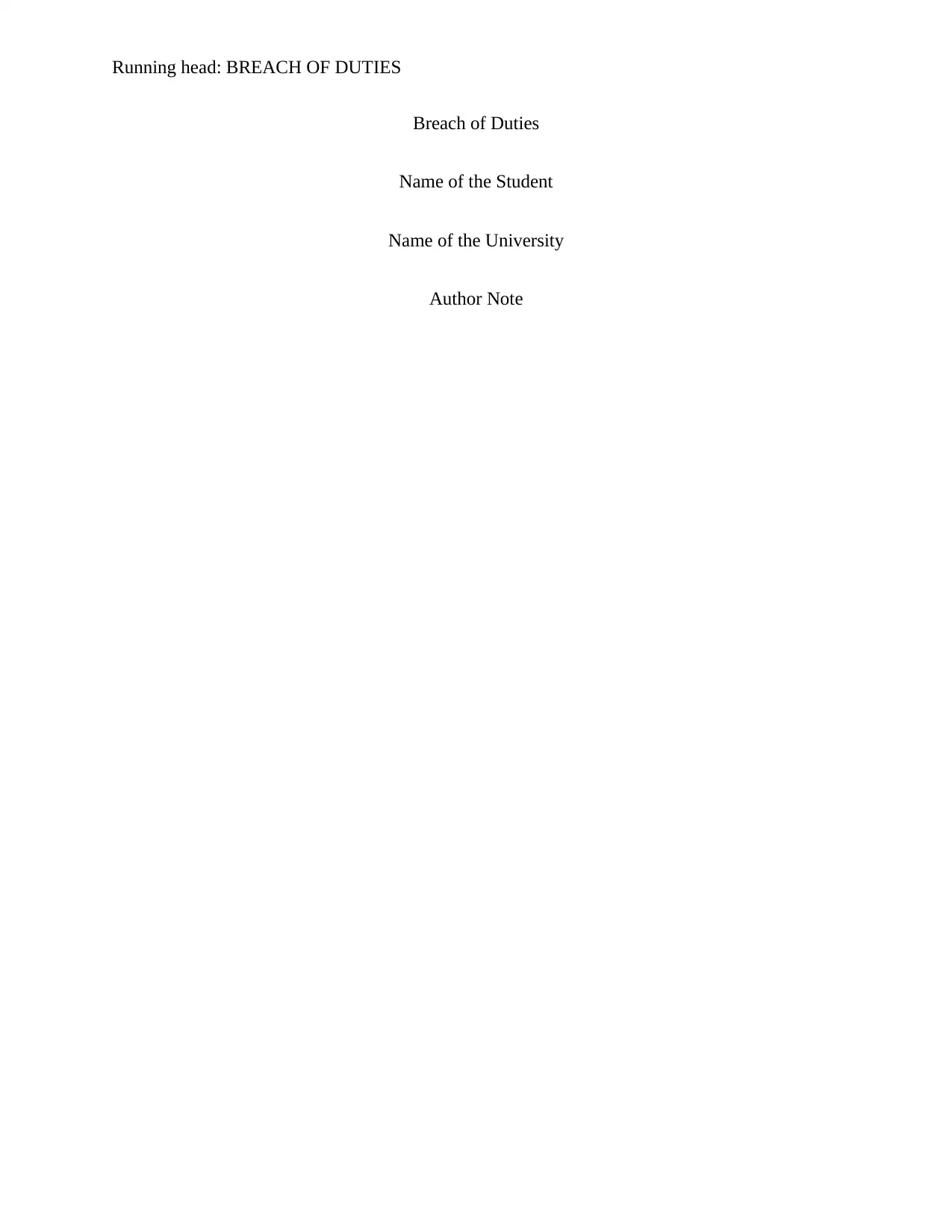
Running head: BREACH OF DUTIES
Breach of Duties
Name of the Student
Name of the University
Author Note
Breach of Duties
Name of the Student
Name of the University
Author Note
Paraphrase This Document
Need a fresh take? Get an instant paraphrase of this document with our AI Paraphraser
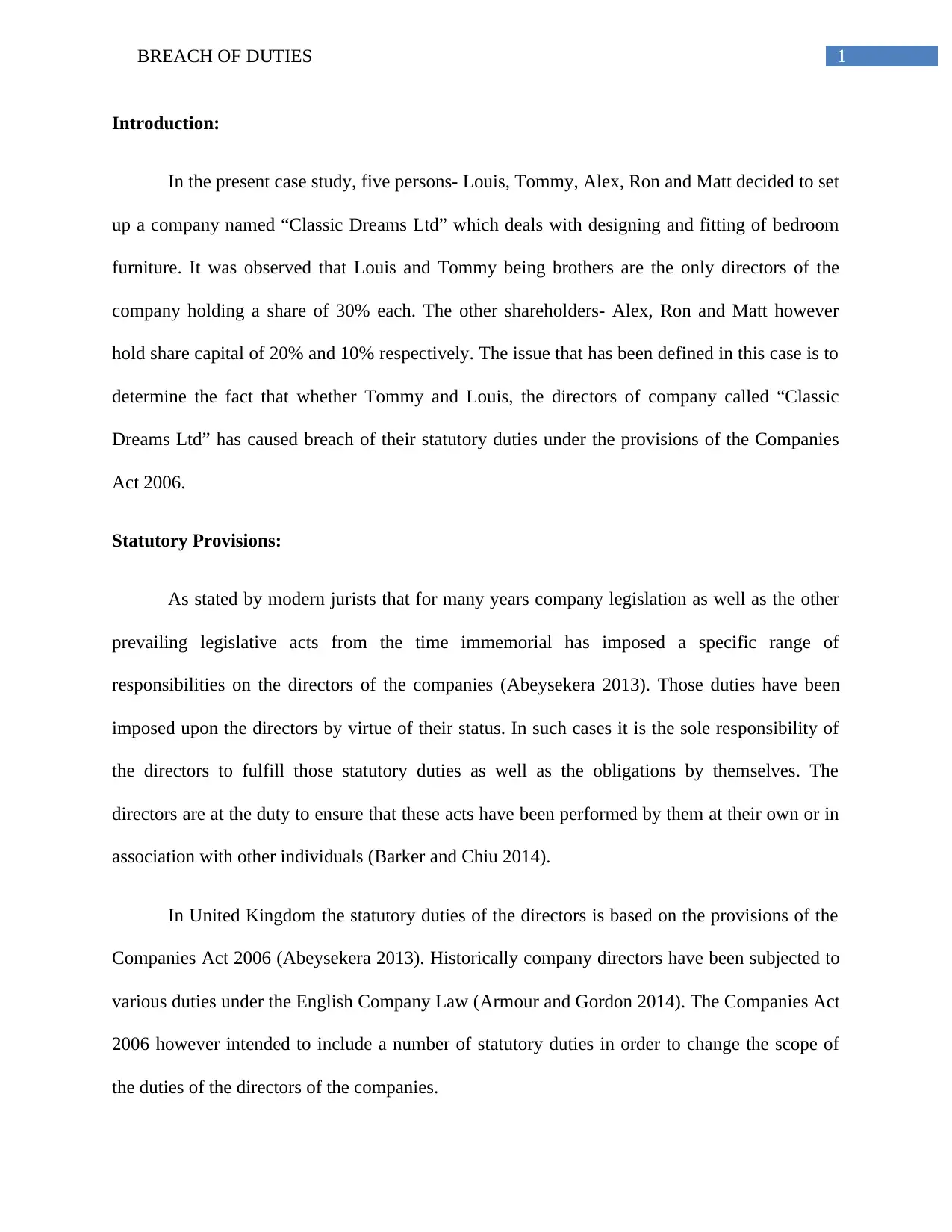
1BREACH OF DUTIES
Introduction:
In the present case study, five persons- Louis, Tommy, Alex, Ron and Matt decided to set
up a company named “Classic Dreams Ltd” which deals with designing and fitting of bedroom
furniture. It was observed that Louis and Tommy being brothers are the only directors of the
company holding a share of 30% each. The other shareholders- Alex, Ron and Matt however
hold share capital of 20% and 10% respectively. The issue that has been defined in this case is to
determine the fact that whether Tommy and Louis, the directors of company called “Classic
Dreams Ltd” has caused breach of their statutory duties under the provisions of the Companies
Act 2006.
Statutory Provisions:
As stated by modern jurists that for many years company legislation as well as the other
prevailing legislative acts from the time immemorial has imposed a specific range of
responsibilities on the directors of the companies (Abeysekera 2013). Those duties have been
imposed upon the directors by virtue of their status. In such cases it is the sole responsibility of
the directors to fulfill those statutory duties as well as the obligations by themselves. The
directors are at the duty to ensure that these acts have been performed by them at their own or in
association with other individuals (Barker and Chiu 2014).
In United Kingdom the statutory duties of the directors is based on the provisions of the
Companies Act 2006 (Abeysekera 2013). Historically company directors have been subjected to
various duties under the English Company Law (Armour and Gordon 2014). The Companies Act
2006 however intended to include a number of statutory duties in order to change the scope of
the duties of the directors of the companies.
Introduction:
In the present case study, five persons- Louis, Tommy, Alex, Ron and Matt decided to set
up a company named “Classic Dreams Ltd” which deals with designing and fitting of bedroom
furniture. It was observed that Louis and Tommy being brothers are the only directors of the
company holding a share of 30% each. The other shareholders- Alex, Ron and Matt however
hold share capital of 20% and 10% respectively. The issue that has been defined in this case is to
determine the fact that whether Tommy and Louis, the directors of company called “Classic
Dreams Ltd” has caused breach of their statutory duties under the provisions of the Companies
Act 2006.
Statutory Provisions:
As stated by modern jurists that for many years company legislation as well as the other
prevailing legislative acts from the time immemorial has imposed a specific range of
responsibilities on the directors of the companies (Abeysekera 2013). Those duties have been
imposed upon the directors by virtue of their status. In such cases it is the sole responsibility of
the directors to fulfill those statutory duties as well as the obligations by themselves. The
directors are at the duty to ensure that these acts have been performed by them at their own or in
association with other individuals (Barker and Chiu 2014).
In United Kingdom the statutory duties of the directors is based on the provisions of the
Companies Act 2006 (Abeysekera 2013). Historically company directors have been subjected to
various duties under the English Company Law (Armour and Gordon 2014). The Companies Act
2006 however intended to include a number of statutory duties in order to change the scope of
the duties of the directors of the companies.
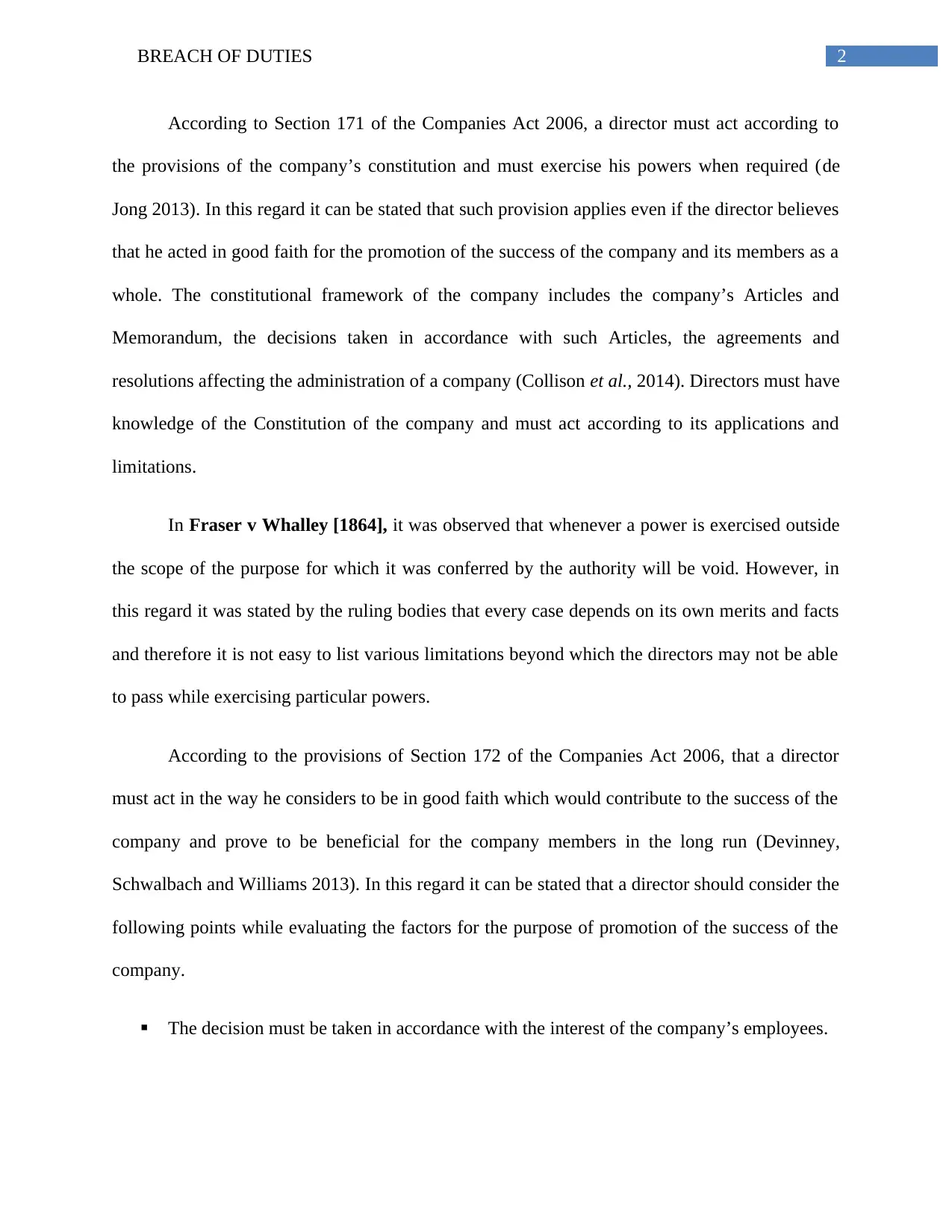
2BREACH OF DUTIES
According to Section 171 of the Companies Act 2006, a director must act according to
the provisions of the company’s constitution and must exercise his powers when required (de
Jong 2013). In this regard it can be stated that such provision applies even if the director believes
that he acted in good faith for the promotion of the success of the company and its members as a
whole. The constitutional framework of the company includes the company’s Articles and
Memorandum, the decisions taken in accordance with such Articles, the agreements and
resolutions affecting the administration of a company (Collison et al., 2014). Directors must have
knowledge of the Constitution of the company and must act according to its applications and
limitations.
In Fraser v Whalley [1864], it was observed that whenever a power is exercised outside
the scope of the purpose for which it was conferred by the authority will be void. However, in
this regard it was stated by the ruling bodies that every case depends on its own merits and facts
and therefore it is not easy to list various limitations beyond which the directors may not be able
to pass while exercising particular powers.
According to the provisions of Section 172 of the Companies Act 2006, that a director
must act in the way he considers to be in good faith which would contribute to the success of the
company and prove to be beneficial for the company members in the long run (Devinney,
Schwalbach and Williams 2013). In this regard it can be stated that a director should consider the
following points while evaluating the factors for the purpose of promotion of the success of the
company.
The decision must be taken in accordance with the interest of the company’s employees.
According to Section 171 of the Companies Act 2006, a director must act according to
the provisions of the company’s constitution and must exercise his powers when required (de
Jong 2013). In this regard it can be stated that such provision applies even if the director believes
that he acted in good faith for the promotion of the success of the company and its members as a
whole. The constitutional framework of the company includes the company’s Articles and
Memorandum, the decisions taken in accordance with such Articles, the agreements and
resolutions affecting the administration of a company (Collison et al., 2014). Directors must have
knowledge of the Constitution of the company and must act according to its applications and
limitations.
In Fraser v Whalley [1864], it was observed that whenever a power is exercised outside
the scope of the purpose for which it was conferred by the authority will be void. However, in
this regard it was stated by the ruling bodies that every case depends on its own merits and facts
and therefore it is not easy to list various limitations beyond which the directors may not be able
to pass while exercising particular powers.
According to the provisions of Section 172 of the Companies Act 2006, that a director
must act in the way he considers to be in good faith which would contribute to the success of the
company and prove to be beneficial for the company members in the long run (Devinney,
Schwalbach and Williams 2013). In this regard it can be stated that a director should consider the
following points while evaluating the factors for the purpose of promotion of the success of the
company.
The decision must be taken in accordance with the interest of the company’s employees.
⊘ This is a preview!⊘
Do you want full access?
Subscribe today to unlock all pages.

Trusted by 1+ million students worldwide
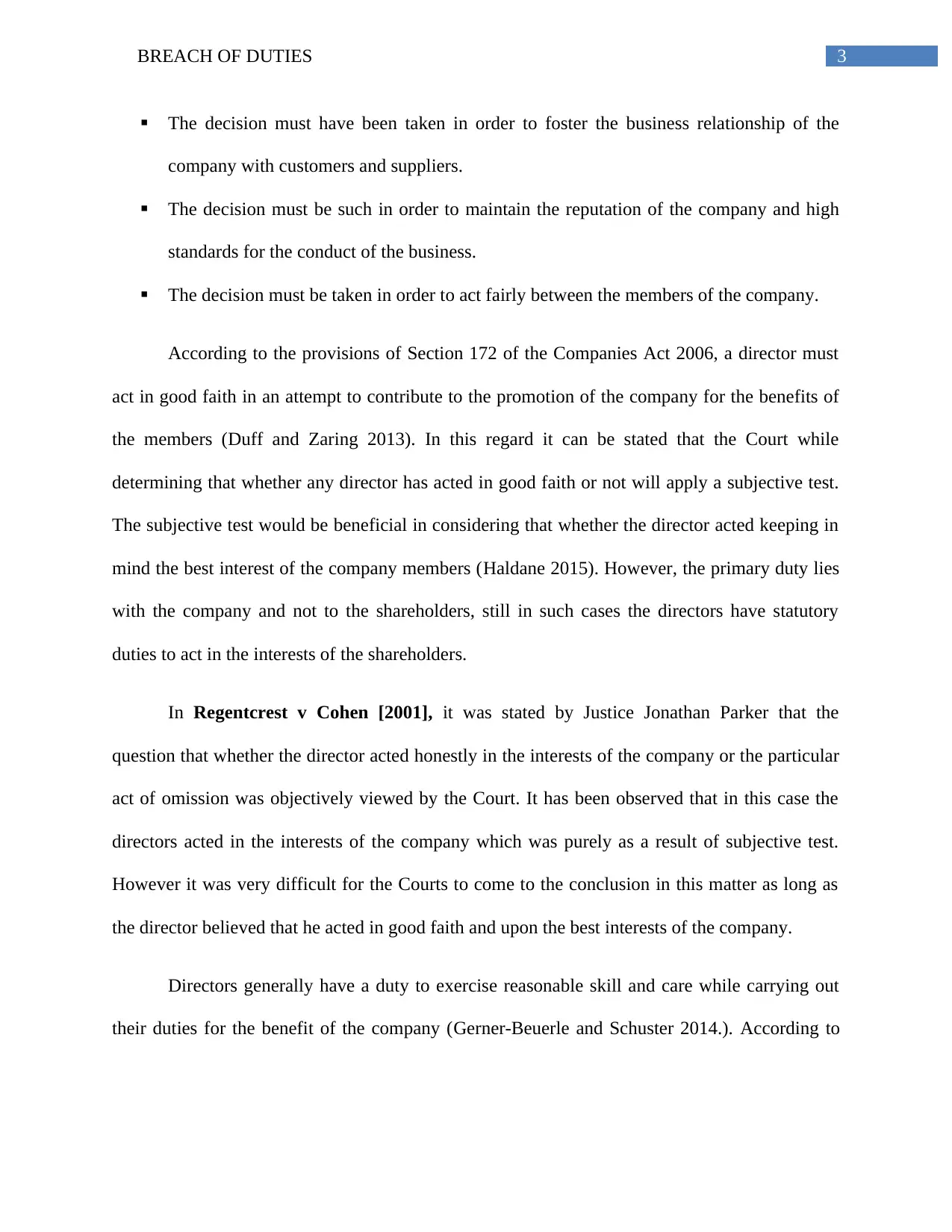
3BREACH OF DUTIES
The decision must have been taken in order to foster the business relationship of the
company with customers and suppliers.
The decision must be such in order to maintain the reputation of the company and high
standards for the conduct of the business.
The decision must be taken in order to act fairly between the members of the company.
According to the provisions of Section 172 of the Companies Act 2006, a director must
act in good faith in an attempt to contribute to the promotion of the company for the benefits of
the members (Duff and Zaring 2013). In this regard it can be stated that the Court while
determining that whether any director has acted in good faith or not will apply a subjective test.
The subjective test would be beneficial in considering that whether the director acted keeping in
mind the best interest of the company members (Haldane 2015). However, the primary duty lies
with the company and not to the shareholders, still in such cases the directors have statutory
duties to act in the interests of the shareholders.
In Regentcrest v Cohen [2001], it was stated by Justice Jonathan Parker that the
question that whether the director acted honestly in the interests of the company or the particular
act of omission was objectively viewed by the Court. It has been observed that in this case the
directors acted in the interests of the company which was purely as a result of subjective test.
However it was very difficult for the Courts to come to the conclusion in this matter as long as
the director believed that he acted in good faith and upon the best interests of the company.
Directors generally have a duty to exercise reasonable skill and care while carrying out
their duties for the benefit of the company (Gerner-Beuerle and Schuster 2014.). According to
The decision must have been taken in order to foster the business relationship of the
company with customers and suppliers.
The decision must be such in order to maintain the reputation of the company and high
standards for the conduct of the business.
The decision must be taken in order to act fairly between the members of the company.
According to the provisions of Section 172 of the Companies Act 2006, a director must
act in good faith in an attempt to contribute to the promotion of the company for the benefits of
the members (Duff and Zaring 2013). In this regard it can be stated that the Court while
determining that whether any director has acted in good faith or not will apply a subjective test.
The subjective test would be beneficial in considering that whether the director acted keeping in
mind the best interest of the company members (Haldane 2015). However, the primary duty lies
with the company and not to the shareholders, still in such cases the directors have statutory
duties to act in the interests of the shareholders.
In Regentcrest v Cohen [2001], it was stated by Justice Jonathan Parker that the
question that whether the director acted honestly in the interests of the company or the particular
act of omission was objectively viewed by the Court. It has been observed that in this case the
directors acted in the interests of the company which was purely as a result of subjective test.
However it was very difficult for the Courts to come to the conclusion in this matter as long as
the director believed that he acted in good faith and upon the best interests of the company.
Directors generally have a duty to exercise reasonable skill and care while carrying out
their duties for the benefit of the company (Gerner-Beuerle and Schuster 2014.). According to
Paraphrase This Document
Need a fresh take? Get an instant paraphrase of this document with our AI Paraphraser
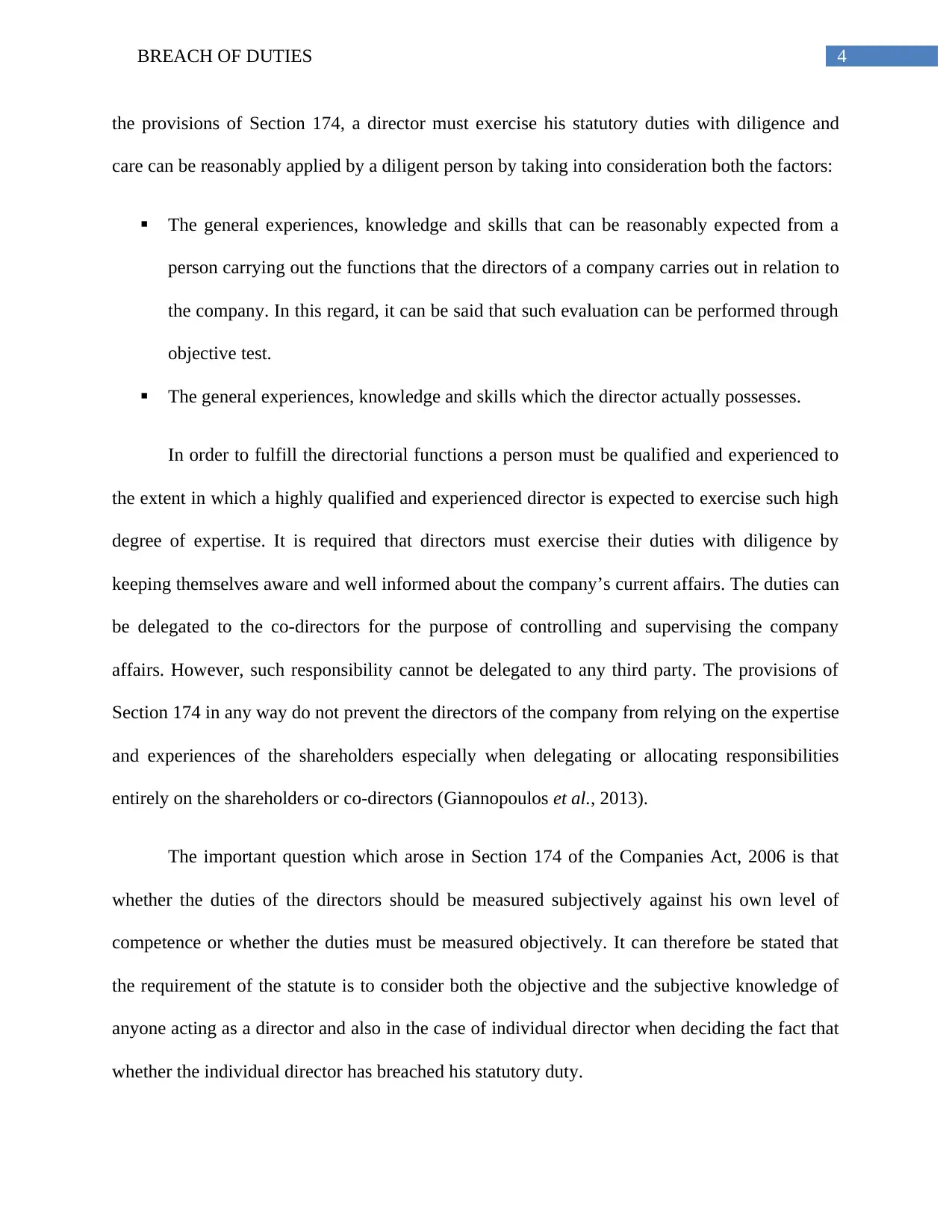
4BREACH OF DUTIES
the provisions of Section 174, a director must exercise his statutory duties with diligence and
care can be reasonably applied by a diligent person by taking into consideration both the factors:
The general experiences, knowledge and skills that can be reasonably expected from a
person carrying out the functions that the directors of a company carries out in relation to
the company. In this regard, it can be said that such evaluation can be performed through
objective test.
The general experiences, knowledge and skills which the director actually possesses.
In order to fulfill the directorial functions a person must be qualified and experienced to
the extent in which a highly qualified and experienced director is expected to exercise such high
degree of expertise. It is required that directors must exercise their duties with diligence by
keeping themselves aware and well informed about the company’s current affairs. The duties can
be delegated to the co-directors for the purpose of controlling and supervising the company
affairs. However, such responsibility cannot be delegated to any third party. The provisions of
Section 174 in any way do not prevent the directors of the company from relying on the expertise
and experiences of the shareholders especially when delegating or allocating responsibilities
entirely on the shareholders or co-directors (Giannopoulos et al., 2013).
The important question which arose in Section 174 of the Companies Act, 2006 is that
whether the duties of the directors should be measured subjectively against his own level of
competence or whether the duties must be measured objectively. It can therefore be stated that
the requirement of the statute is to consider both the objective and the subjective knowledge of
anyone acting as a director and also in the case of individual director when deciding the fact that
whether the individual director has breached his statutory duty.
the provisions of Section 174, a director must exercise his statutory duties with diligence and
care can be reasonably applied by a diligent person by taking into consideration both the factors:
The general experiences, knowledge and skills that can be reasonably expected from a
person carrying out the functions that the directors of a company carries out in relation to
the company. In this regard, it can be said that such evaluation can be performed through
objective test.
The general experiences, knowledge and skills which the director actually possesses.
In order to fulfill the directorial functions a person must be qualified and experienced to
the extent in which a highly qualified and experienced director is expected to exercise such high
degree of expertise. It is required that directors must exercise their duties with diligence by
keeping themselves aware and well informed about the company’s current affairs. The duties can
be delegated to the co-directors for the purpose of controlling and supervising the company
affairs. However, such responsibility cannot be delegated to any third party. The provisions of
Section 174 in any way do not prevent the directors of the company from relying on the expertise
and experiences of the shareholders especially when delegating or allocating responsibilities
entirely on the shareholders or co-directors (Giannopoulos et al., 2013).
The important question which arose in Section 174 of the Companies Act, 2006 is that
whether the duties of the directors should be measured subjectively against his own level of
competence or whether the duties must be measured objectively. It can therefore be stated that
the requirement of the statute is to consider both the objective and the subjective knowledge of
anyone acting as a director and also in the case of individual director when deciding the fact that
whether the individual director has breached his statutory duty.
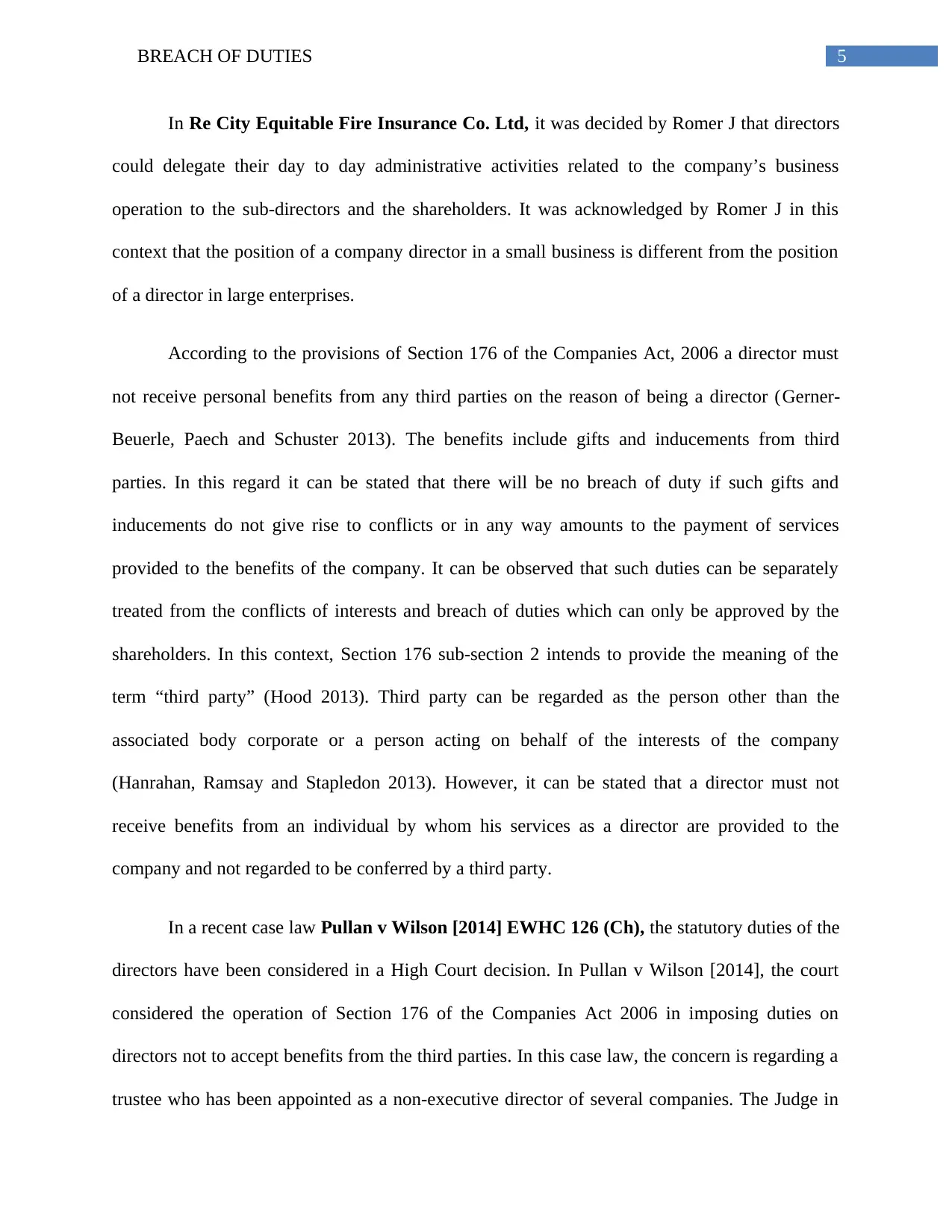
5BREACH OF DUTIES
In Re City Equitable Fire Insurance Co. Ltd, it was decided by Romer J that directors
could delegate their day to day administrative activities related to the company’s business
operation to the sub-directors and the shareholders. It was acknowledged by Romer J in this
context that the position of a company director in a small business is different from the position
of a director in large enterprises.
According to the provisions of Section 176 of the Companies Act, 2006 a director must
not receive personal benefits from any third parties on the reason of being a director (Gerner-
Beuerle, Paech and Schuster 2013). The benefits include gifts and inducements from third
parties. In this regard it can be stated that there will be no breach of duty if such gifts and
inducements do not give rise to conflicts or in any way amounts to the payment of services
provided to the benefits of the company. It can be observed that such duties can be separately
treated from the conflicts of interests and breach of duties which can only be approved by the
shareholders. In this context, Section 176 sub-section 2 intends to provide the meaning of the
term “third party” (Hood 2013). Third party can be regarded as the person other than the
associated body corporate or a person acting on behalf of the interests of the company
(Hanrahan, Ramsay and Stapledon 2013). However, it can be stated that a director must not
receive benefits from an individual by whom his services as a director are provided to the
company and not regarded to be conferred by a third party.
In a recent case law Pullan v Wilson [2014] EWHC 126 (Ch), the statutory duties of the
directors have been considered in a High Court decision. In Pullan v Wilson [2014], the court
considered the operation of Section 176 of the Companies Act 2006 in imposing duties on
directors not to accept benefits from the third parties. In this case law, the concern is regarding a
trustee who has been appointed as a non-executive director of several companies. The Judge in
In Re City Equitable Fire Insurance Co. Ltd, it was decided by Romer J that directors
could delegate their day to day administrative activities related to the company’s business
operation to the sub-directors and the shareholders. It was acknowledged by Romer J in this
context that the position of a company director in a small business is different from the position
of a director in large enterprises.
According to the provisions of Section 176 of the Companies Act, 2006 a director must
not receive personal benefits from any third parties on the reason of being a director (Gerner-
Beuerle, Paech and Schuster 2013). The benefits include gifts and inducements from third
parties. In this regard it can be stated that there will be no breach of duty if such gifts and
inducements do not give rise to conflicts or in any way amounts to the payment of services
provided to the benefits of the company. It can be observed that such duties can be separately
treated from the conflicts of interests and breach of duties which can only be approved by the
shareholders. In this context, Section 176 sub-section 2 intends to provide the meaning of the
term “third party” (Hood 2013). Third party can be regarded as the person other than the
associated body corporate or a person acting on behalf of the interests of the company
(Hanrahan, Ramsay and Stapledon 2013). However, it can be stated that a director must not
receive benefits from an individual by whom his services as a director are provided to the
company and not regarded to be conferred by a third party.
In a recent case law Pullan v Wilson [2014] EWHC 126 (Ch), the statutory duties of the
directors have been considered in a High Court decision. In Pullan v Wilson [2014], the court
considered the operation of Section 176 of the Companies Act 2006 in imposing duties on
directors not to accept benefits from the third parties. In this case law, the concern is regarding a
trustee who has been appointed as a non-executive director of several companies. The Judge in
⊘ This is a preview!⊘
Do you want full access?
Subscribe today to unlock all pages.

Trusted by 1+ million students worldwide
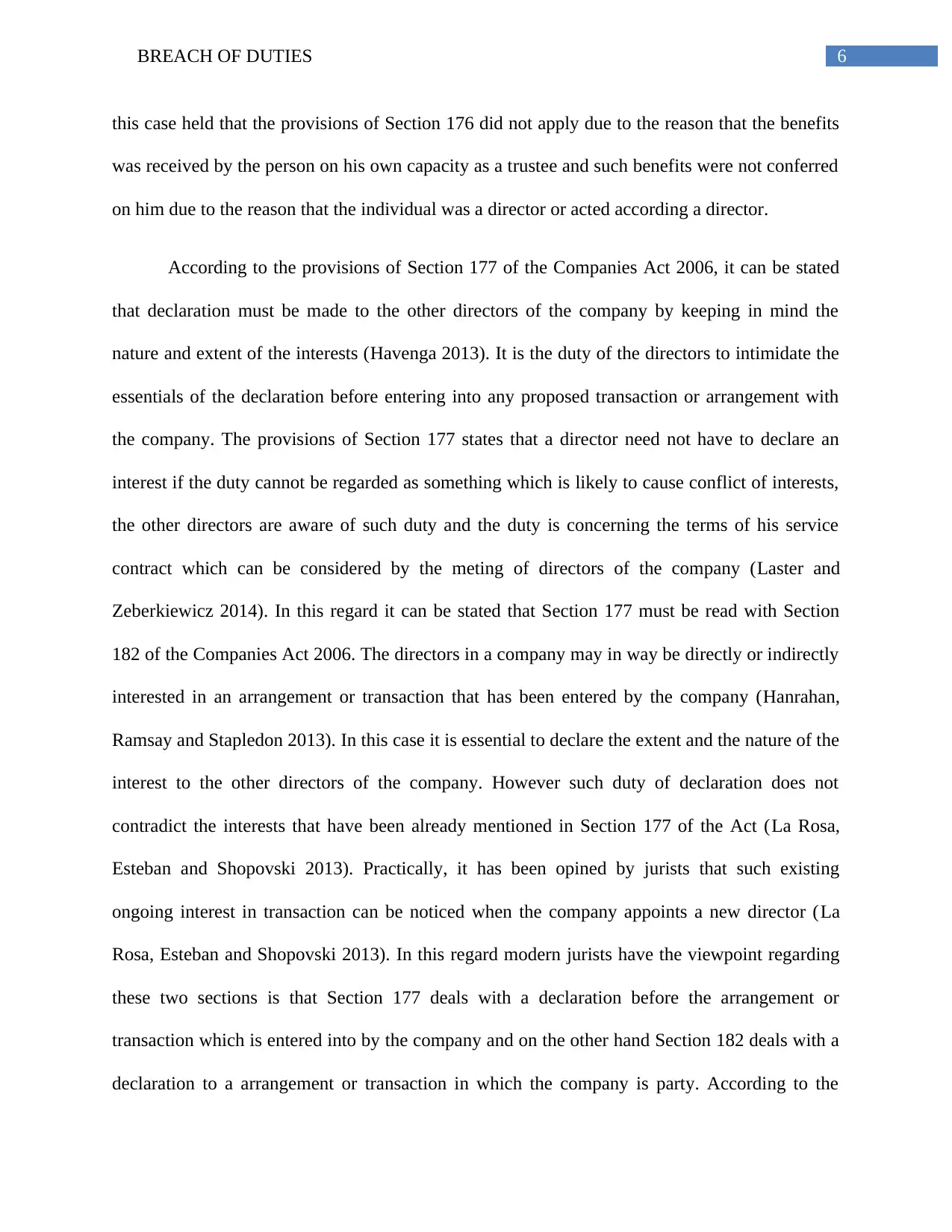
6BREACH OF DUTIES
this case held that the provisions of Section 176 did not apply due to the reason that the benefits
was received by the person on his own capacity as a trustee and such benefits were not conferred
on him due to the reason that the individual was a director or acted according a director.
According to the provisions of Section 177 of the Companies Act 2006, it can be stated
that declaration must be made to the other directors of the company by keeping in mind the
nature and extent of the interests (Havenga 2013). It is the duty of the directors to intimidate the
essentials of the declaration before entering into any proposed transaction or arrangement with
the company. The provisions of Section 177 states that a director need not have to declare an
interest if the duty cannot be regarded as something which is likely to cause conflict of interests,
the other directors are aware of such duty and the duty is concerning the terms of his service
contract which can be considered by the meting of directors of the company (Laster and
Zeberkiewicz 2014). In this regard it can be stated that Section 177 must be read with Section
182 of the Companies Act 2006. The directors in a company may in way be directly or indirectly
interested in an arrangement or transaction that has been entered by the company (Hanrahan,
Ramsay and Stapledon 2013). In this case it is essential to declare the extent and the nature of the
interest to the other directors of the company. However such duty of declaration does not
contradict the interests that have been already mentioned in Section 177 of the Act (La Rosa,
Esteban and Shopovski 2013). Practically, it has been opined by jurists that such existing
ongoing interest in transaction can be noticed when the company appoints a new director (La
Rosa, Esteban and Shopovski 2013). In this regard modern jurists have the viewpoint regarding
these two sections is that Section 177 deals with a declaration before the arrangement or
transaction which is entered into by the company and on the other hand Section 182 deals with a
declaration to a arrangement or transaction in which the company is party. According to the
this case held that the provisions of Section 176 did not apply due to the reason that the benefits
was received by the person on his own capacity as a trustee and such benefits were not conferred
on him due to the reason that the individual was a director or acted according a director.
According to the provisions of Section 177 of the Companies Act 2006, it can be stated
that declaration must be made to the other directors of the company by keeping in mind the
nature and extent of the interests (Havenga 2013). It is the duty of the directors to intimidate the
essentials of the declaration before entering into any proposed transaction or arrangement with
the company. The provisions of Section 177 states that a director need not have to declare an
interest if the duty cannot be regarded as something which is likely to cause conflict of interests,
the other directors are aware of such duty and the duty is concerning the terms of his service
contract which can be considered by the meting of directors of the company (Laster and
Zeberkiewicz 2014). In this regard it can be stated that Section 177 must be read with Section
182 of the Companies Act 2006. The directors in a company may in way be directly or indirectly
interested in an arrangement or transaction that has been entered by the company (Hanrahan,
Ramsay and Stapledon 2013). In this case it is essential to declare the extent and the nature of the
interest to the other directors of the company. However such duty of declaration does not
contradict the interests that have been already mentioned in Section 177 of the Act (La Rosa,
Esteban and Shopovski 2013). Practically, it has been opined by jurists that such existing
ongoing interest in transaction can be noticed when the company appoints a new director (La
Rosa, Esteban and Shopovski 2013). In this regard modern jurists have the viewpoint regarding
these two sections is that Section 177 deals with a declaration before the arrangement or
transaction which is entered into by the company and on the other hand Section 182 deals with a
declaration to a arrangement or transaction in which the company is party. According to the
Paraphrase This Document
Need a fresh take? Get an instant paraphrase of this document with our AI Paraphraser
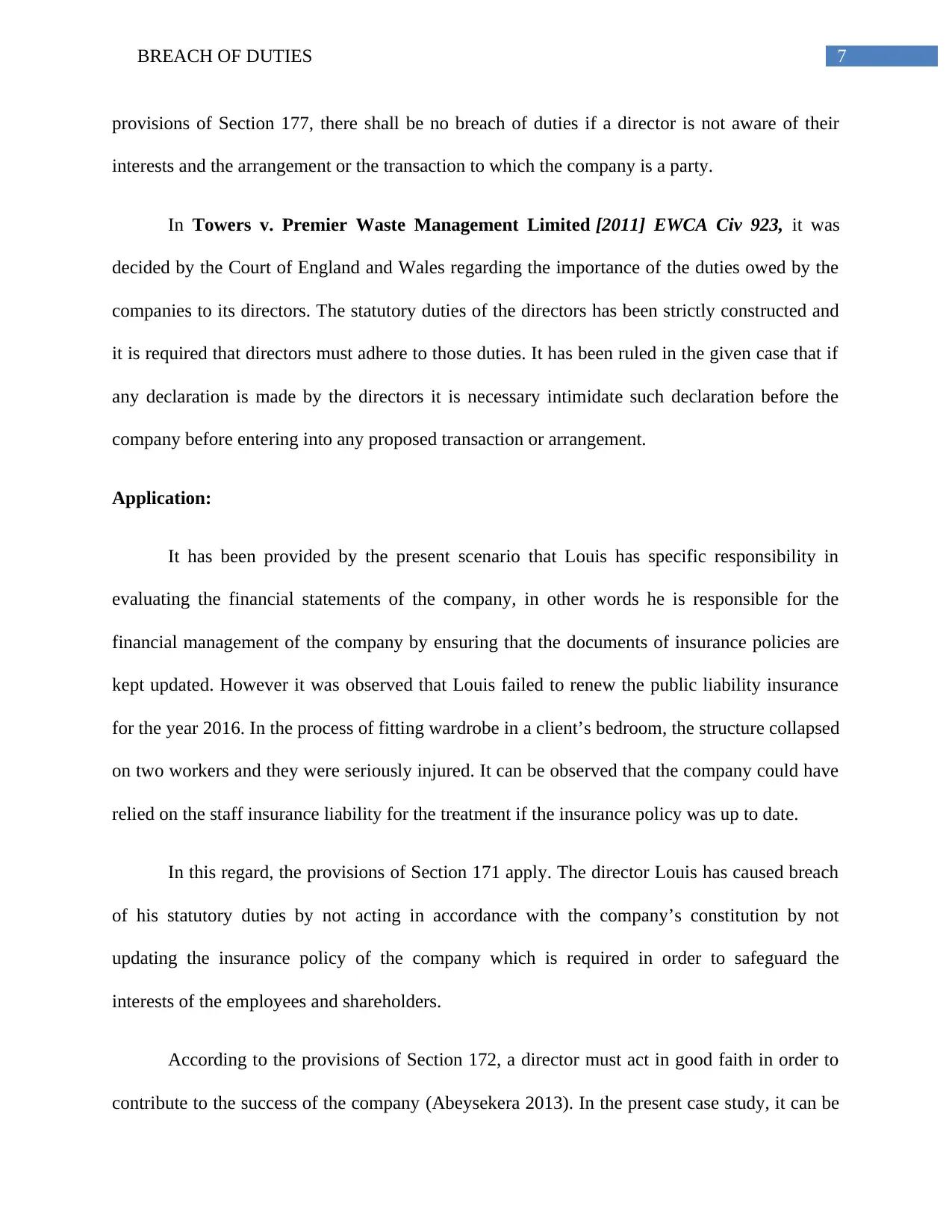
7BREACH OF DUTIES
provisions of Section 177, there shall be no breach of duties if a director is not aware of their
interests and the arrangement or the transaction to which the company is a party.
In Towers v. Premier Waste Management Limited [2011] EWCA Civ 923, it was
decided by the Court of England and Wales regarding the importance of the duties owed by the
companies to its directors. The statutory duties of the directors has been strictly constructed and
it is required that directors must adhere to those duties. It has been ruled in the given case that if
any declaration is made by the directors it is necessary intimidate such declaration before the
company before entering into any proposed transaction or arrangement.
Application:
It has been provided by the present scenario that Louis has specific responsibility in
evaluating the financial statements of the company, in other words he is responsible for the
financial management of the company by ensuring that the documents of insurance policies are
kept updated. However it was observed that Louis failed to renew the public liability insurance
for the year 2016. In the process of fitting wardrobe in a client’s bedroom, the structure collapsed
on two workers and they were seriously injured. It can be observed that the company could have
relied on the staff insurance liability for the treatment if the insurance policy was up to date.
In this regard, the provisions of Section 171 apply. The director Louis has caused breach
of his statutory duties by not acting in accordance with the company’s constitution by not
updating the insurance policy of the company which is required in order to safeguard the
interests of the employees and shareholders.
According to the provisions of Section 172, a director must act in good faith in order to
contribute to the success of the company (Abeysekera 2013). In the present case study, it can be
provisions of Section 177, there shall be no breach of duties if a director is not aware of their
interests and the arrangement or the transaction to which the company is a party.
In Towers v. Premier Waste Management Limited [2011] EWCA Civ 923, it was
decided by the Court of England and Wales regarding the importance of the duties owed by the
companies to its directors. The statutory duties of the directors has been strictly constructed and
it is required that directors must adhere to those duties. It has been ruled in the given case that if
any declaration is made by the directors it is necessary intimidate such declaration before the
company before entering into any proposed transaction or arrangement.
Application:
It has been provided by the present scenario that Louis has specific responsibility in
evaluating the financial statements of the company, in other words he is responsible for the
financial management of the company by ensuring that the documents of insurance policies are
kept updated. However it was observed that Louis failed to renew the public liability insurance
for the year 2016. In the process of fitting wardrobe in a client’s bedroom, the structure collapsed
on two workers and they were seriously injured. It can be observed that the company could have
relied on the staff insurance liability for the treatment if the insurance policy was up to date.
In this regard, the provisions of Section 171 apply. The director Louis has caused breach
of his statutory duties by not acting in accordance with the company’s constitution by not
updating the insurance policy of the company which is required in order to safeguard the
interests of the employees and shareholders.
According to the provisions of Section 172, a director must act in good faith in order to
contribute to the success of the company (Abeysekera 2013). In the present case study, it can be
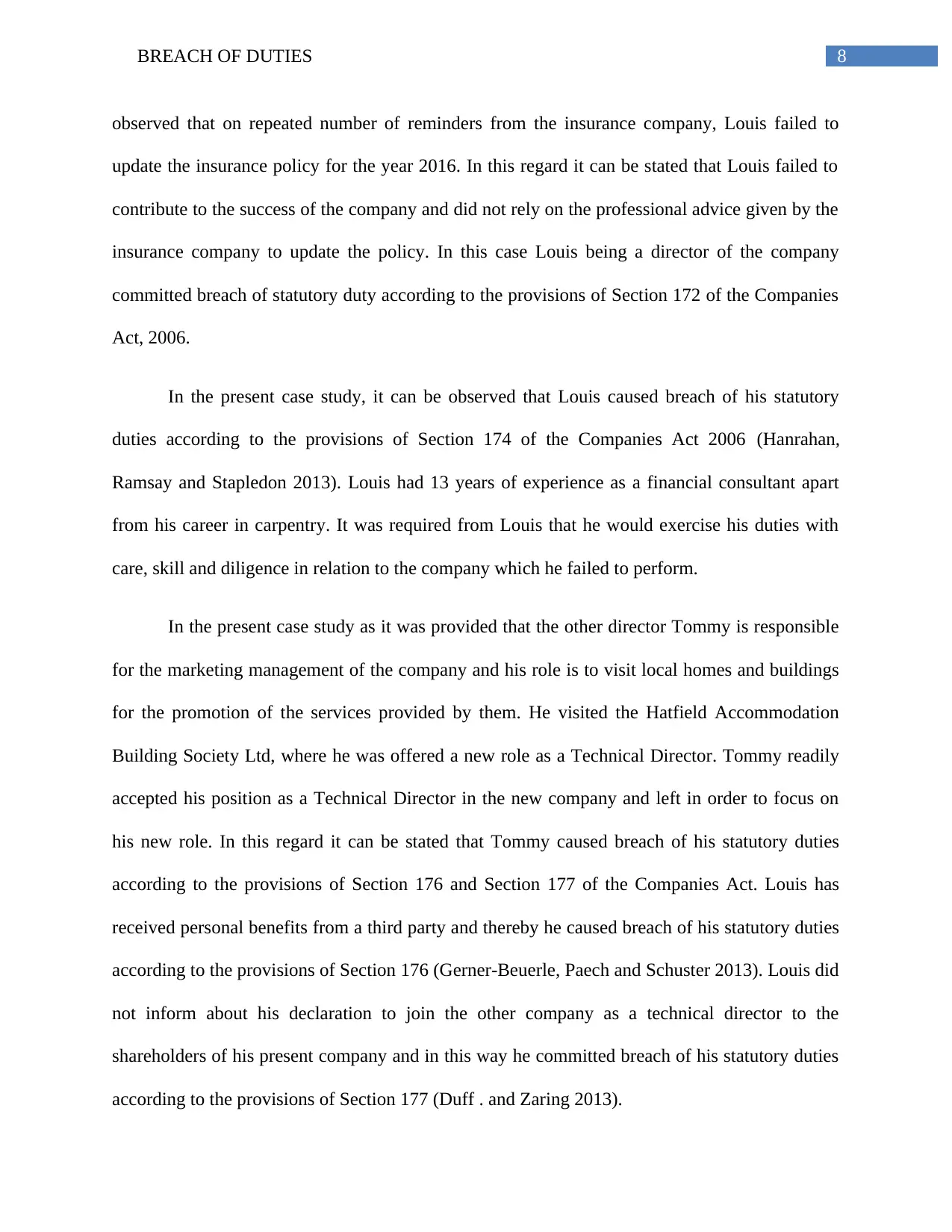
8BREACH OF DUTIES
observed that on repeated number of reminders from the insurance company, Louis failed to
update the insurance policy for the year 2016. In this regard it can be stated that Louis failed to
contribute to the success of the company and did not rely on the professional advice given by the
insurance company to update the policy. In this case Louis being a director of the company
committed breach of statutory duty according to the provisions of Section 172 of the Companies
Act, 2006.
In the present case study, it can be observed that Louis caused breach of his statutory
duties according to the provisions of Section 174 of the Companies Act 2006 (Hanrahan,
Ramsay and Stapledon 2013). Louis had 13 years of experience as a financial consultant apart
from his career in carpentry. It was required from Louis that he would exercise his duties with
care, skill and diligence in relation to the company which he failed to perform.
In the present case study as it was provided that the other director Tommy is responsible
for the marketing management of the company and his role is to visit local homes and buildings
for the promotion of the services provided by them. He visited the Hatfield Accommodation
Building Society Ltd, where he was offered a new role as a Technical Director. Tommy readily
accepted his position as a Technical Director in the new company and left in order to focus on
his new role. In this regard it can be stated that Tommy caused breach of his statutory duties
according to the provisions of Section 176 and Section 177 of the Companies Act. Louis has
received personal benefits from a third party and thereby he caused breach of his statutory duties
according to the provisions of Section 176 (Gerner-Beuerle, Paech and Schuster 2013). Louis did
not inform about his declaration to join the other company as a technical director to the
shareholders of his present company and in this way he committed breach of his statutory duties
according to the provisions of Section 177 (Duff . and Zaring 2013).
observed that on repeated number of reminders from the insurance company, Louis failed to
update the insurance policy for the year 2016. In this regard it can be stated that Louis failed to
contribute to the success of the company and did not rely on the professional advice given by the
insurance company to update the policy. In this case Louis being a director of the company
committed breach of statutory duty according to the provisions of Section 172 of the Companies
Act, 2006.
In the present case study, it can be observed that Louis caused breach of his statutory
duties according to the provisions of Section 174 of the Companies Act 2006 (Hanrahan,
Ramsay and Stapledon 2013). Louis had 13 years of experience as a financial consultant apart
from his career in carpentry. It was required from Louis that he would exercise his duties with
care, skill and diligence in relation to the company which he failed to perform.
In the present case study as it was provided that the other director Tommy is responsible
for the marketing management of the company and his role is to visit local homes and buildings
for the promotion of the services provided by them. He visited the Hatfield Accommodation
Building Society Ltd, where he was offered a new role as a Technical Director. Tommy readily
accepted his position as a Technical Director in the new company and left in order to focus on
his new role. In this regard it can be stated that Tommy caused breach of his statutory duties
according to the provisions of Section 176 and Section 177 of the Companies Act. Louis has
received personal benefits from a third party and thereby he caused breach of his statutory duties
according to the provisions of Section 176 (Gerner-Beuerle, Paech and Schuster 2013). Louis did
not inform about his declaration to join the other company as a technical director to the
shareholders of his present company and in this way he committed breach of his statutory duties
according to the provisions of Section 177 (Duff . and Zaring 2013).
⊘ This is a preview!⊘
Do you want full access?
Subscribe today to unlock all pages.

Trusted by 1+ million students worldwide
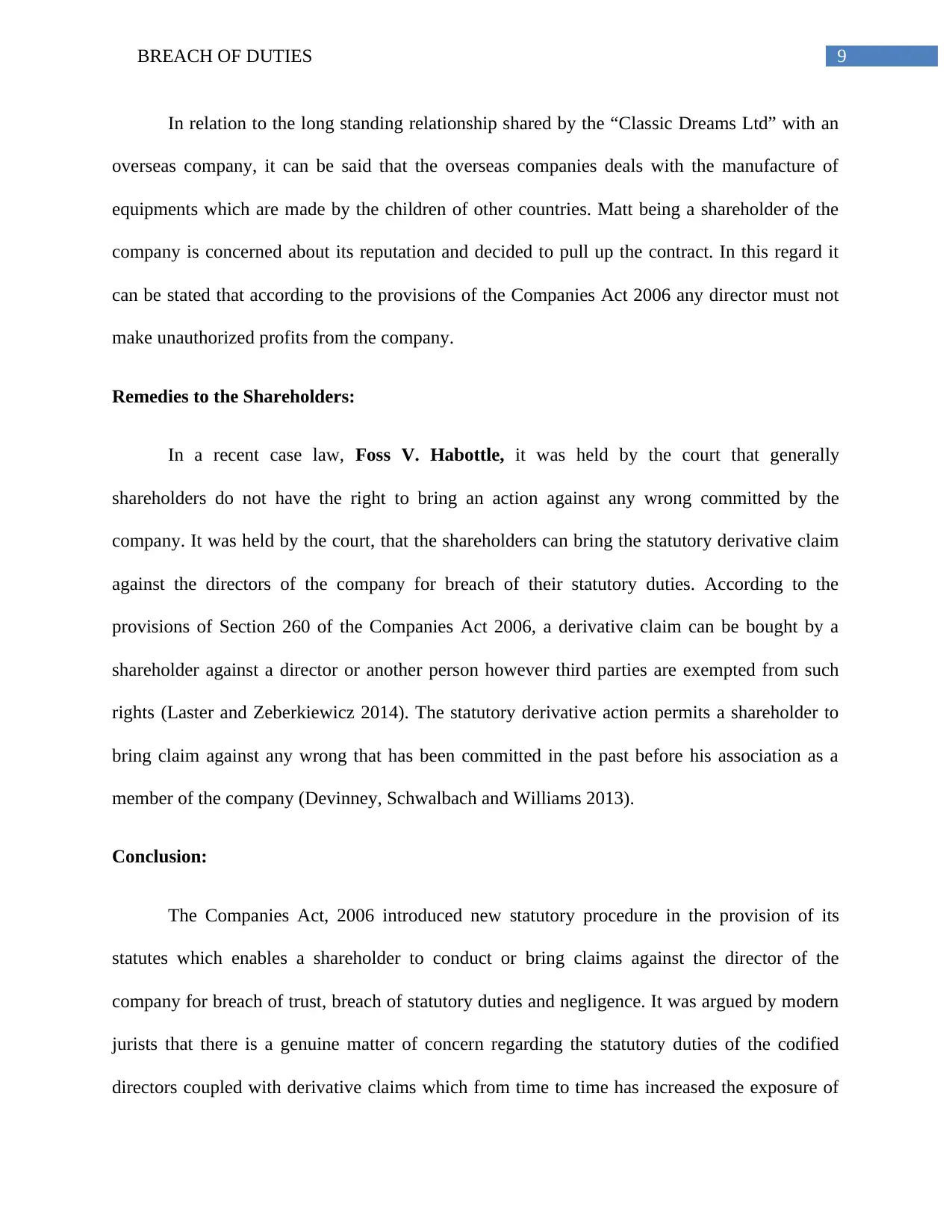
9BREACH OF DUTIES
In relation to the long standing relationship shared by the “Classic Dreams Ltd” with an
overseas company, it can be said that the overseas companies deals with the manufacture of
equipments which are made by the children of other countries. Matt being a shareholder of the
company is concerned about its reputation and decided to pull up the contract. In this regard it
can be stated that according to the provisions of the Companies Act 2006 any director must not
make unauthorized profits from the company.
Remedies to the Shareholders:
In a recent case law, Foss V. Habottle, it was held by the court that generally
shareholders do not have the right to bring an action against any wrong committed by the
company. It was held by the court, that the shareholders can bring the statutory derivative claim
against the directors of the company for breach of their statutory duties. According to the
provisions of Section 260 of the Companies Act 2006, a derivative claim can be bought by a
shareholder against a director or another person however third parties are exempted from such
rights (Laster and Zeberkiewicz 2014). The statutory derivative action permits a shareholder to
bring claim against any wrong that has been committed in the past before his association as a
member of the company (Devinney, Schwalbach and Williams 2013).
Conclusion:
The Companies Act, 2006 introduced new statutory procedure in the provision of its
statutes which enables a shareholder to conduct or bring claims against the director of the
company for breach of trust, breach of statutory duties and negligence. It was argued by modern
jurists that there is a genuine matter of concern regarding the statutory duties of the codified
directors coupled with derivative claims which from time to time has increased the exposure of
In relation to the long standing relationship shared by the “Classic Dreams Ltd” with an
overseas company, it can be said that the overseas companies deals with the manufacture of
equipments which are made by the children of other countries. Matt being a shareholder of the
company is concerned about its reputation and decided to pull up the contract. In this regard it
can be stated that according to the provisions of the Companies Act 2006 any director must not
make unauthorized profits from the company.
Remedies to the Shareholders:
In a recent case law, Foss V. Habottle, it was held by the court that generally
shareholders do not have the right to bring an action against any wrong committed by the
company. It was held by the court, that the shareholders can bring the statutory derivative claim
against the directors of the company for breach of their statutory duties. According to the
provisions of Section 260 of the Companies Act 2006, a derivative claim can be bought by a
shareholder against a director or another person however third parties are exempted from such
rights (Laster and Zeberkiewicz 2014). The statutory derivative action permits a shareholder to
bring claim against any wrong that has been committed in the past before his association as a
member of the company (Devinney, Schwalbach and Williams 2013).
Conclusion:
The Companies Act, 2006 introduced new statutory procedure in the provision of its
statutes which enables a shareholder to conduct or bring claims against the director of the
company for breach of trust, breach of statutory duties and negligence. It was argued by modern
jurists that there is a genuine matter of concern regarding the statutory duties of the codified
directors coupled with derivative claims which from time to time has increased the exposure of
Paraphrase This Document
Need a fresh take? Get an instant paraphrase of this document with our AI Paraphraser
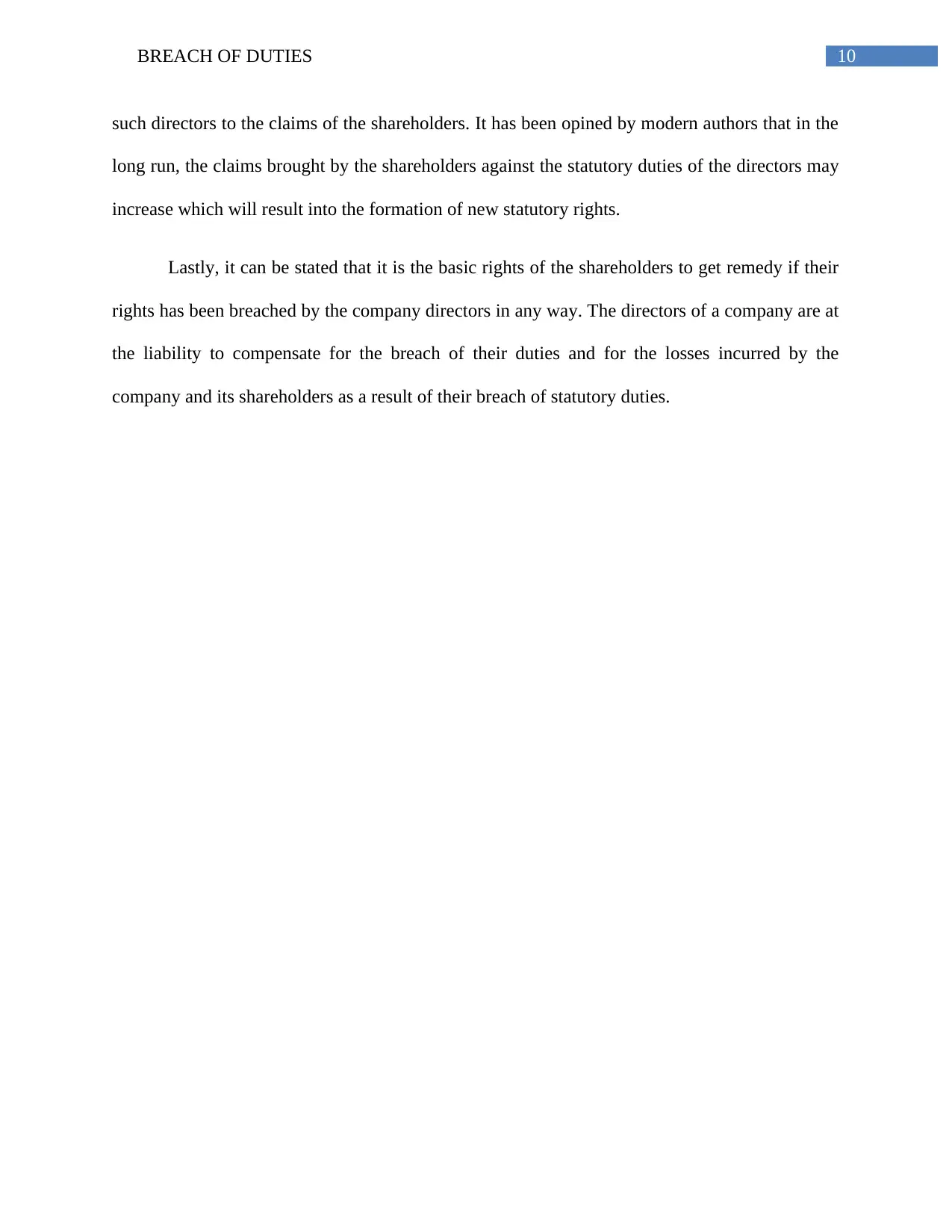
10BREACH OF DUTIES
such directors to the claims of the shareholders. It has been opined by modern authors that in the
long run, the claims brought by the shareholders against the statutory duties of the directors may
increase which will result into the formation of new statutory rights.
Lastly, it can be stated that it is the basic rights of the shareholders to get remedy if their
rights has been breached by the company directors in any way. The directors of a company are at
the liability to compensate for the breach of their duties and for the losses incurred by the
company and its shareholders as a result of their breach of statutory duties.
such directors to the claims of the shareholders. It has been opined by modern authors that in the
long run, the claims brought by the shareholders against the statutory duties of the directors may
increase which will result into the formation of new statutory rights.
Lastly, it can be stated that it is the basic rights of the shareholders to get remedy if their
rights has been breached by the company directors in any way. The directors of a company are at
the liability to compensate for the breach of their duties and for the losses incurred by the
company and its shareholders as a result of their breach of statutory duties.
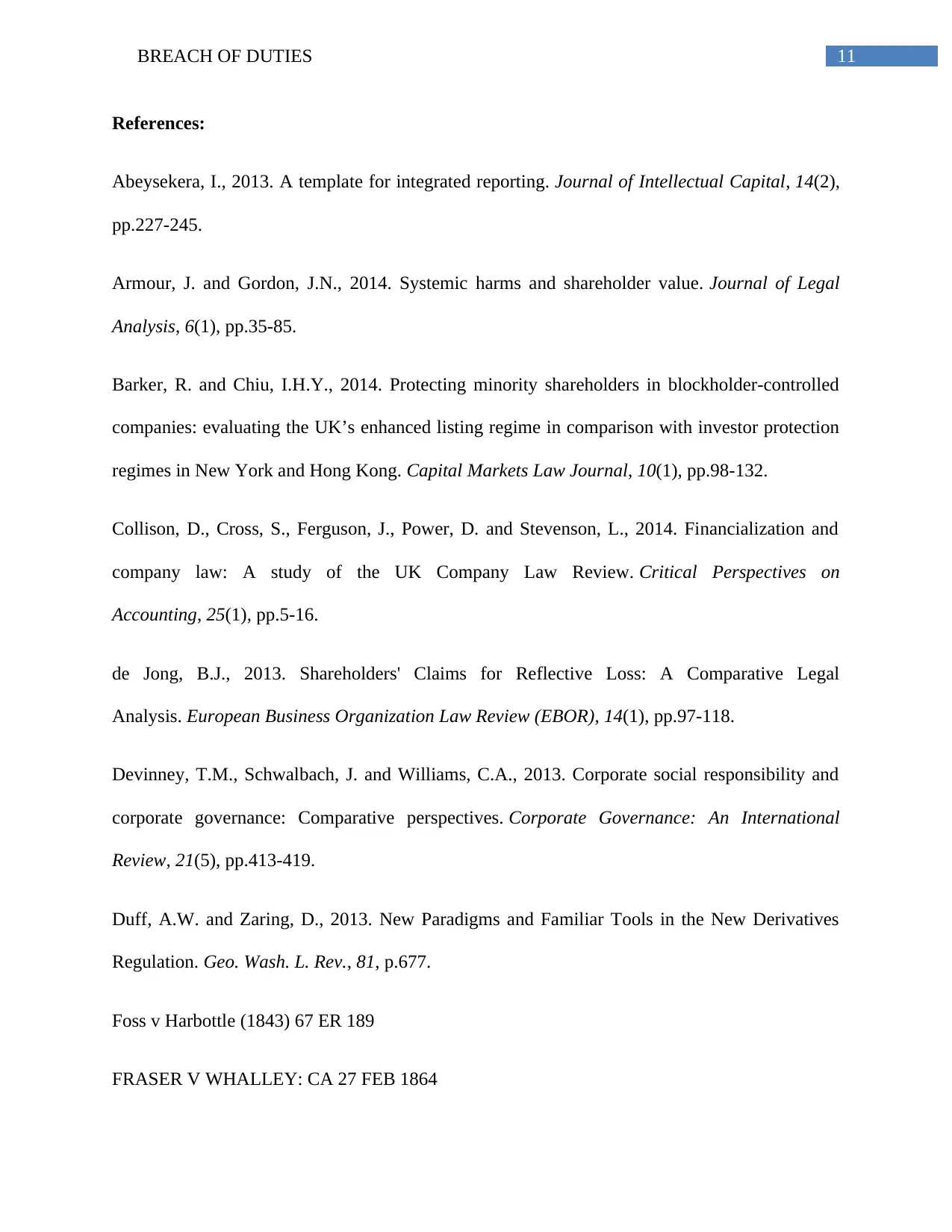
11BREACH OF DUTIES
References:
Abeysekera, I., 2013. A template for integrated reporting. Journal of Intellectual Capital, 14(2),
pp.227-245.
Armour, J. and Gordon, J.N., 2014. Systemic harms and shareholder value. Journal of Legal
Analysis, 6(1), pp.35-85.
Barker, R. and Chiu, I.H.Y., 2014. Protecting minority shareholders in blockholder-controlled
companies: evaluating the UK’s enhanced listing regime in comparison with investor protection
regimes in New York and Hong Kong. Capital Markets Law Journal, 10(1), pp.98-132.
Collison, D., Cross, S., Ferguson, J., Power, D. and Stevenson, L., 2014. Financialization and
company law: A study of the UK Company Law Review. Critical Perspectives on
Accounting, 25(1), pp.5-16.
de Jong, B.J., 2013. Shareholders' Claims for Reflective Loss: A Comparative Legal
Analysis. European Business Organization Law Review (EBOR), 14(1), pp.97-118.
Devinney, T.M., Schwalbach, J. and Williams, C.A., 2013. Corporate social responsibility and
corporate governance: Comparative perspectives. Corporate Governance: An International
Review, 21(5), pp.413-419.
Duff, A.W. and Zaring, D., 2013. New Paradigms and Familiar Tools in the New Derivatives
Regulation. Geo. Wash. L. Rev., 81, p.677.
Foss v Harbottle (1843) 67 ER 189
FRASER V WHALLEY: CA 27 FEB 1864
References:
Abeysekera, I., 2013. A template for integrated reporting. Journal of Intellectual Capital, 14(2),
pp.227-245.
Armour, J. and Gordon, J.N., 2014. Systemic harms and shareholder value. Journal of Legal
Analysis, 6(1), pp.35-85.
Barker, R. and Chiu, I.H.Y., 2014. Protecting minority shareholders in blockholder-controlled
companies: evaluating the UK’s enhanced listing regime in comparison with investor protection
regimes in New York and Hong Kong. Capital Markets Law Journal, 10(1), pp.98-132.
Collison, D., Cross, S., Ferguson, J., Power, D. and Stevenson, L., 2014. Financialization and
company law: A study of the UK Company Law Review. Critical Perspectives on
Accounting, 25(1), pp.5-16.
de Jong, B.J., 2013. Shareholders' Claims for Reflective Loss: A Comparative Legal
Analysis. European Business Organization Law Review (EBOR), 14(1), pp.97-118.
Devinney, T.M., Schwalbach, J. and Williams, C.A., 2013. Corporate social responsibility and
corporate governance: Comparative perspectives. Corporate Governance: An International
Review, 21(5), pp.413-419.
Duff, A.W. and Zaring, D., 2013. New Paradigms and Familiar Tools in the New Derivatives
Regulation. Geo. Wash. L. Rev., 81, p.677.
Foss v Harbottle (1843) 67 ER 189
FRASER V WHALLEY: CA 27 FEB 1864
⊘ This is a preview!⊘
Do you want full access?
Subscribe today to unlock all pages.

Trusted by 1+ million students worldwide
1 out of 14
Related Documents
Your All-in-One AI-Powered Toolkit for Academic Success.
+13062052269
info@desklib.com
Available 24*7 on WhatsApp / Email
![[object Object]](/_next/static/media/star-bottom.7253800d.svg)
Unlock your academic potential
Copyright © 2020–2025 A2Z Services. All Rights Reserved. Developed and managed by ZUCOL.





